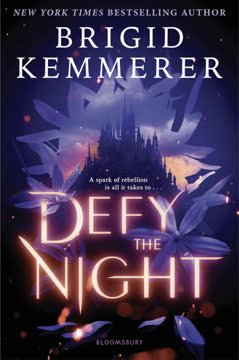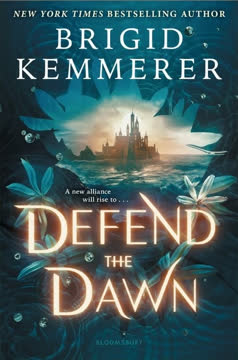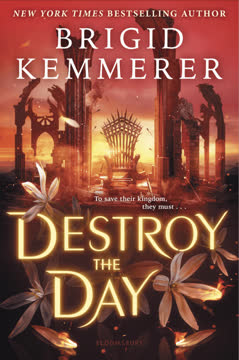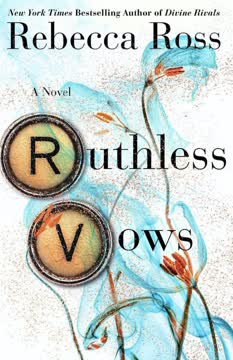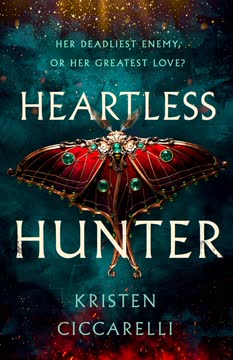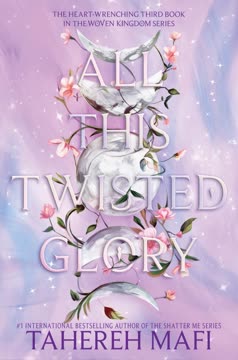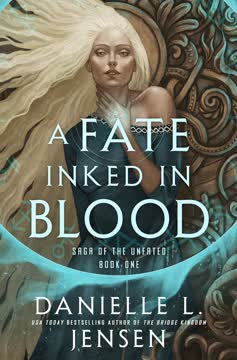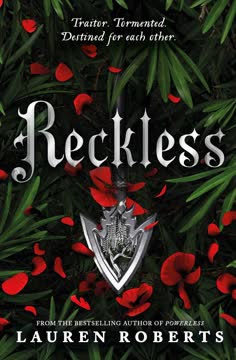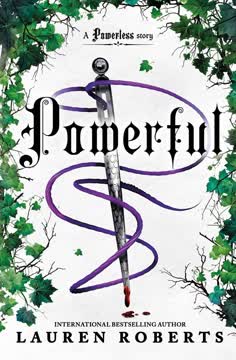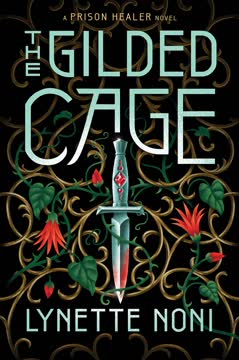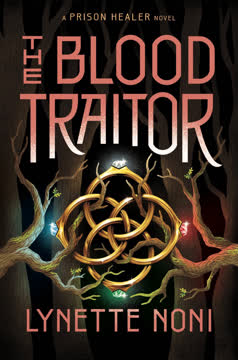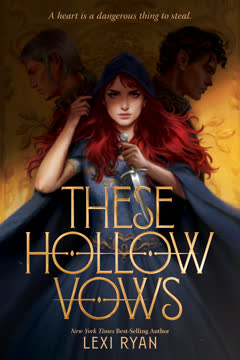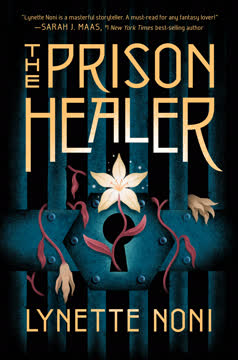Plot Summary
Outlaws in the Shadows
Tessa Cade and her partner, known as Wes, are outlaws in the kingdom of Kandala, risking their lives to steal Moonflower petals—the only cure for a deadly fever ravaging the poor. By night, they slip through shadows, scaling walls and evading patrols to deliver medicine to those who cannot afford it. Tessa, an apothecary's daughter, is driven by the memory of her parents' execution for the same crime. Wes, mysterious and skilled, is her only friend and confidant. Their partnership is built on trust, secrecy, and a shared sense of justice. As they move through the Wilds, the desperation of the people is palpable, and every act of kindness is shadowed by the threat of brutal punishment from the king and his brother. Their nightly mission is both a rebellion and a lifeline.
The King's Justice
King Harristan and his younger brother, Prince Corrick, rule Kandala with iron and calculation. After their parents' assassination, the brothers learned that kindness is a weakness, and now rule through fear and swift, public punishment. Corrick, the King's Justice, is infamous for his cruelty, meting out death to smugglers and traitors. The council of consuls, each representing a sector, is rife with political intrigue and self-interest, especially over the control and distribution of Moonflower petals. The brothers' relationship is close but strained by the burdens of power and the ever-present threat of rebellion. Harristan's health is fragile, and Corrick's reputation as an executioner isolates him. Their rule is a delicate balance between maintaining order and stoking resentment among the suffering populace.
Medicine for the Dying
Tessa and Wes's nightly rounds are a race against time and death. The fever claims lives swiftly, and the medicine they bring is never enough. The poor die in droves while the rich hoard the cure. When a boy named Gillis dies despite their efforts, his mother's grief and rage echo the hopelessness of the Wilds. The night patrol's brutality is on full display as they execute Gillis's mother for her outcry. Tessa and Wes are left shaken, their sense of purpose mingled with guilt and fury. The cost of compassion is high, and the line between justice and survival blurs. Their bond deepens in the face of loss, but the risks grow ever greater as the king's grip tightens.
Brothers and Betrayal
Corrick and Harristan's brotherhood is forged in trauma and secrecy. As children, they snuck into the Wilds, learning the ways of the people they now rule. The memory of their parents' murder shapes every decision, and trust is a rare commodity. The consuls' ambitions and betrayals are constant threats. Corrick's role as the King's Justice is both shield and sword, protecting Harristan but costing him his soul. The brothers' private moments reveal vulnerability and longing for a better world, but public life demands ruthlessness. The specter of rebellion looms, and every act of mercy is a potential weakness. Their love for each other is both their strength and their greatest liability.
The Price of Survival
The kingdom's suffering breeds desperation and crime. Smuggling rings grow bolder, and the night patrol's violence escalates. Corrick is forced to negotiate with the consuls who control the Moonflower supply, especially the cunning Allisander Sallister. Prices rise, and the poor are squeezed further. Tessa's world is rocked when a group of smugglers is captured and executed, and she fears Wes may be among them. The lines between right and wrong blur as survival becomes a political act. Tessa's grief and rage threaten to consume her, but Wes's return brings relief and a deepening of their connection. Their secret work is both rebellion and hope, but the kingdom's tensions are reaching a breaking point.
Executions and Rebellion
A mass execution at the gates becomes a flashpoint. The king and Corrick stage a public display of power, executing smugglers as a warning. The crowd's horror turns to anger, and calls for rebellion ring out. The people's suffering is laid bare, and the king's attempts at order only fuel the flames of dissent. Tessa witnesses the brutality firsthand, her hatred for the rulers deepening. The execution is both a spectacle and a catalyst, pushing the kingdom closer to open revolt. Corrick's role as executioner isolates him further, and the brothers' rule is more precarious than ever. The seeds of revolution are sown in blood and fear.
Masks and Secrets
Tessa's world is upended when she is captured in the palace and discovers Wes's true identity: he is Prince Corrick, the King's Justice. The revelation is a devastating betrayal, and Tessa is thrust into the heart of palace intrigue. Corrick's double life is exposed, and the trust between them is shattered. Both are forced to confront the consequences of their secrets. Tessa's compassion and Corrick's longing for redemption collide in a storm of emotion. The palace is a labyrinth of lies, and survival depends on navigating shifting alliances. Their relationship is tested by truth, and the possibility of forgiveness hangs in the balance.
The Hold and the Heartless
Corrick and Tessa are both imprisoned—Corrick by his own brother's suspicions, Tessa by her association with him. The Hold is a place of suffering and despair, where justice is a weapon. The consuls maneuver for power, and Allisander's ambitions threaten to tip the kingdom into chaos. Corrick faces the consequences of his double life, and Tessa's fate is uncertain. The king's trust is fragile, and the cost of mercy is high. The Hold becomes a crucible, testing loyalty, love, and the limits of endurance. The heartlessness of power is laid bare, and the future of Kandala hangs by a thread.
Revolution Ignites
The simmering unrest explodes into open revolution. Rebels attack the Hold, freeing prisoners and setting the palace ablaze. The consuls' conspiracy is revealed, and the kingdom descends into chaos. Harristan and Corrick are forced to flee, their rule in jeopardy. Tessa becomes a bridge between the rulers and the people, her compassion and courage a beacon in the darkness. The lines between friend and enemy blur as old alliances crumble. The cost of survival is measured in blood and fire. The revolution is both a reckoning and an opportunity for change, but the outcome is far from certain.
The Truth Unmasked
In the aftermath of violence, truths are revealed and old wounds laid bare. Corrick and Tessa confront their feelings and the consequences of their actions. Harristan must choose between vengeance and mercy, and the consuls' treachery is exposed. The people's suffering is acknowledged, and the possibility of a new order emerges. Tessa's role as healer and advocate becomes central, and Corrick's longing for redemption finds hope in her forgiveness. The masks fall away, and the characters are forced to reckon with who they truly are. The path to healing is fraught, but the first steps are taken.
The King's Dilemma
Harristan faces an impossible choice: maintain order through fear and violence, or risk everything for mercy and reform. The council of consuls is fractured, and the people demand justice. Tessa's advocacy for amnesty and a council of the people challenges the old ways. Corrick's willingness to step down as King's Justice signals a new era. The king's dilemma is the kingdom's: can Kandala be saved without more bloodshed? The answer lies in the willingness to listen, to change, and to trust. The cost of mercy is high, but the cost of cruelty is higher. The future hangs in the balance.
The People's Council
In the wake of rebellion, Harristan agrees to form a council that includes not just consuls but representatives of the people. Tessa becomes a liaison, her compassion and experience bridging the gap between rulers and ruled. The distribution of medicine is reformed, and the hoarding of Moonflower petals is curtailed. The people's suffering is acknowledged, and their voices are heard for the first time. The council is a fragile experiment, but it offers hope for a more just and equitable Kandala. The old order is not easily dismantled, but the seeds of change are planted.
The Cost of Mercy
Amnesty is granted to the rebels, and the cycle of vengeance is broken—at least for now. The king's willingness to forgive is both a risk and a promise. The people's trust is hard-won, and the wounds of the past are slow to heal. Corrick's resignation as King's Justice is both a relief and a loss, and his relationship with Tessa deepens in the space left by power. The cost of mercy is borne by all, but it is the only path to peace. The kingdom is changed, but the work of healing has only begun.
The Consuls' Conspiracy
The true architects of the kingdom's suffering are revealed: Allisander and Lissa, the consuls who controlled the Moonflower supply, manipulated the people and the throne for profit and revenge. Their conspiracy fueled the rebellion and nearly destroyed Kandala. The exposure of their crimes is both justice and warning. The dangers of unchecked ambition and the corrosive power of greed are laid bare. The kingdom's future depends on vigilance, transparency, and the willingness to hold the powerful accountable. The lessons of betrayal are hard-won, but essential for survival.
The Night the Palace Burned
The attack on the palace is the crucible in which the future of Kandala is forged. Fire and violence threaten to consume everything, but in the chaos, new alliances are formed and old enmities are set aside. Tessa's courage and compassion are instrumental in saving lives and forging peace. Corrick and Harristan's bond is tested but ultimately strengthened. The night the palace burned is both an ending and a beginning—a moment when the old order dies and the possibility of a new, more just kingdom is born. The scars of that night will linger, but so will the hope it ignited.
Love and Loyalty
In the aftermath, Tessa and Corrick find solace in each other. Their love, forged in secrecy and danger, becomes a source of strength and healing. Harristan and Corrick's brotherhood is renewed, and the bonds of trust are slowly rebuilt. The kingdom is still fragile, but the promise of change is real. Tessa's role as healer and adviser is recognized, and her voice becomes central to the new order. The work of rebuilding is just beginning, but love and loyalty offer hope for a better future. The night is no longer something to be feared, but a space for dreams and new beginnings.
The End of Cruelty
Kandala is forever changed. The era of cruelty and fear gives way to one of compassion and justice. The council of the people is established, and the distribution of medicine is reformed. The consuls' power is checked, and the king's rule is tempered by mercy. Corrick's resignation as King's Justice marks the end of an age, and Tessa's rise as a voice for the people signals a new beginning. The scars of the past remain, but the future is shaped by those who dared to defy the night. The story ends with hope, love, and the promise that even in the darkest times, change is possible.
Characters
Tessa Cade
Tessa is the heart of the story—a young apothecary's daughter turned outlaw after her parents' execution for smuggling medicine. Driven by compassion and a fierce sense of justice, she risks her life nightly to bring Moonflower elixir to the dying poor. Tessa's intelligence, empathy, and courage make her both a healer and a rebel. Her partnership with Wes (Corrick) is built on trust, secrecy, and shared purpose, but is shattered by betrayal when his true identity is revealed. Tessa's journey is one of loss, forgiveness, and growth; she becomes the bridge between rulers and people, advocating for mercy and reform. Her love for Corrick is both a source of strength and vulnerability, and her voice becomes central to the kingdom's transformation.
Prince Corrick / Wes
Corrick is the King's Justice, feared for his cruelty and swift punishment. But beneath the mask, he is Wes—the outlaw who risks everything to help the people he is sworn to rule. Corrick's double life is a desperate attempt to reconcile duty and conscience, love and loyalty. His relationship with his brother Harristan is both anchor and burden, and his love for Tessa is a lifeline in a world of secrets and violence. Corrick is tormented by guilt, longing for forgiveness and a chance to do better. His journey is one of self-discovery, sacrifice, and the painful shedding of old identities. In the end, he chooses compassion over cruelty, and love over fear.
King Harristan
Harristan ascended the throne after witnessing his parents' assassination, and rules with a mix of fear, calculation, and vulnerability. His health is fragile, and his trust is hard-won. Harristan's relationship with Corrick is central—he relies on his brother's ruthlessness to maintain order, but is haunted by the cost. The king is torn between the demands of power and the longing for mercy. His willingness to listen, to change, and to include the people in governance marks his growth. Harristan's journey is one of learning to trust, to forgive, and to lead not just with strength, but with compassion.
Allisander Sallister
Allisander is the consul of Moonlight Plains, controlling half the kingdom's Moonflower supply. Driven by ambition, greed, and old wounds, he manipulates both the throne and the people for personal gain. Allisander's conspiracy with Lissa Marpetta to inflate prices and fuel rebellion is the root of much of Kandala's suffering. He is cunning, ruthless, and ultimately self-destructive. His rivalry with Harristan and Corrick is both personal and political, and his downfall is a warning about the dangers of unchecked power and resentment.
Lissa Marpetta
Lissa is the consul of Emberridge, controlling the other half of the Moonflower supply. She is quieter than Allisander but equally complicit in the conspiracy to manipulate medicine and profit from suffering. Lissa's passivity masks ambition, and her willingness to maintain the status quo makes her dangerous. Her alliance with Allisander is rooted in shared interests, but her downfall comes when the truth is exposed. Lissa represents the insidious nature of silent complicity in systems of oppression.
Lochlan
Lochlan is a blacksmith-turned-rebel, driven by desperation and the suffering of his people. He is both victim and perpetrator, leading attacks on supply runs and the palace itself. Lochlan's anger is righteous but often misdirected, and his willingness to use violence is both a strength and a flaw. His relationship with Tessa is complex—he trusts her but cannot forgive Corrick. Lochlan embodies the pain and rage of the oppressed, and his journey is a cautionary tale about the costs of vengeance and the need for hope.
Quint
Quint is the palace master, young for his role but indispensable. He is Corrick's confidant and co-conspirator, helping to cover for his absences and keep his secrets. Quint's loyalty is unwavering, and his wit and resourcefulness are vital in moments of crisis. He is a bridge between the rulers and the staff, and his friendship with Corrick is a rare source of comfort. Quint's role grows as the kingdom changes, and his ability to adapt is key to survival.
Karri
Karri is Tessa's friend and fellow apothecary assistant, who becomes involved with the rebels out of compassion and necessity. Her journey mirrors Tessa's, as she moves from bystander to active participant in the fight for justice. Karri's skills as a healer and her willingness to risk everything for others make her a quiet revolutionary. Her relationship with Lochlan adds depth to the rebel cause, and her loyalty to Tessa is unwavering.
Arella Cherry
Arella is the consul of Sunkeep, known for her compassion and advocacy for the poor. She is one of the few consuls to challenge the status quo and push for reform. Arella's alliance with Roydan and her willingness to risk political capital for mercy make her a key figure in the kingdom's transformation. She represents the possibility of principled leadership and the importance of listening to the people.
Roydan Pelham
Roydan is the oldest consul, representing the Sorrowlands. He is cautious, experienced, and often underestimated. Roydan's alliance with Arella signals a shift in the council's dynamics, and his willingness to support reform is crucial. He is a survivor, navigating the treacherous waters of palace politics with wisdom and care. Roydan's presence is a reminder of the value of experience and the need for allies in times of change.
Plot Devices
Dual Narratives and Hidden Identities
The novel alternates between Tessa and Corrick's points of view, allowing readers to experience both the suffering of the people and the burdens of power. This duality is mirrored in Corrick's double life as Wes, the outlaw. The use of hidden identities and masks is central, both literally and metaphorically. The tension between public roles and private selves drives the plot, and the gradual unmasking of secrets is both a source of suspense and emotional depth. The narrative structure allows for foreshadowing, dramatic irony, and a deep exploration of trust and betrayal.
Political Intrigue and Rebellion
The kingdom's political structure—king, prince, consuls, and people—is a web of alliances, rivalries, and betrayals. The control of Moonflower petals is both a literal and symbolic source of power. The consuls' conspiracy to manipulate medicine and fuel rebellion is revealed through careful foreshadowing and shifting alliances. The rebellion is both a plot device and a thematic exploration of justice, mercy, and the cost of survival. The use of public executions, riots, and the burning of the palace are climactic moments that force characters to confront their values and choices.
Mercy, Justice, and the Cost of Change
The central plot device is the tension between mercy and justice, embodied in Corrick's role as the King's Justice and Tessa's as a healer. The cost of cruelty is weighed against the risks of compassion. The granting of amnesty, the formation of a council of the people, and the exposure of the consuls' conspiracy are all turning points that hinge on the willingness to forgive and to change. The novel uses these devices to explore the possibility of redemption, both personal and political, and the hard work of building a better world.
Analysis
Defy the Night is a powerful exploration of justice, mercy, and the transformative power of compassion in the face of systemic cruelty. Through its dual narrative, the novel immerses readers in both the suffering of the oppressed and the burdens of those in power, refusing to offer easy answers or simple villains. The story's emotional arc is driven by the tension between survival and morality, love and loyalty, and the ever-present threat of betrayal. The use of hidden identities and shifting alliances underscores the complexity of change—true transformation requires not just new laws, but new ways of seeing and being. The novel's central lesson is that real justice is not found in fear or violence, but in the willingness to listen, to forgive, and to act with courage and empathy. In a world where the lines between right and wrong are blurred by desperation, Defy the Night insists that hope is an act of defiance, and that even in the darkest times, a single act of kindness can ignite a revolution.
Last updated:
Review Summary
Defy the Night received mixed reviews, with ratings ranging from 1 to 5 stars. Many readers praised the engaging plot, well-developed characters, and political intrigue. The romance between Tessa and Corrick was particularly well-received. Some appreciated the relevant themes and fast-paced storytelling. However, critics found the worldbuilding lacking, the plot predictable, and the characters frustrating. Several reviewers noted similarities to other YA fantasy novels. Despite the divided opinions, many readers expressed excitement for the sequel.
